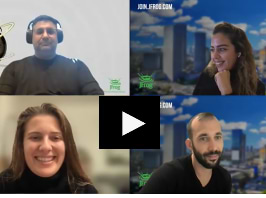Serverless Architecture An Honest Conversation – Women in DevOps Meetup Panel
1月 20, 2022
2 min read
The Women in DevOps community came together for our first Women in DevOps networking initiative of 2022, ‘Serverless architecture an honest conversation’ hosted by the lovely Sabrina Battiston.
Serverless computing has gained a lot of buzz over the past few years in the tech community, as well as its fair share of advocates, fans, and a few sceptics. But what exactly is serverless architecture, and what are its implications for your business or team?
During the discussion we were joined with three market leading experts, Danielle Heberling a Software Engineer from Tango, Ixchel Ruiz a Developer Advocate from JFrog and Jessica Chappell a Senior DevOps Engineer at Epistemix, who explored all sides of serverless.
The discussion began with Jessica showcasing an interactive live demo where Serverless was brought to life. Jess explained the architectural walk through of serverless functions with practical scenarios. The panel then explored the benefits of adopting serverless in relation to the enhanced functionality and not having to reinvent the wheel, with speakers in agreement that it simplified processes and the overall management of infrastructure.
We explored what serverless adoption looks like within different organisations and covered the costs associated with serverless. Our panel reiterated the importance of adopting a security mindset for serverless security best practices. Lastly, we uncovered how the serverless model has impacted our experts’ roles on a day-to-day basis, with improvements such as speeding up processes, enabling them to think in a more abstract way, and work collaboratively with their team.
We would like to thank our fabulous panel for their insights, as well as our wonderful platinum sponsor JFrog for the prize giveaway.












